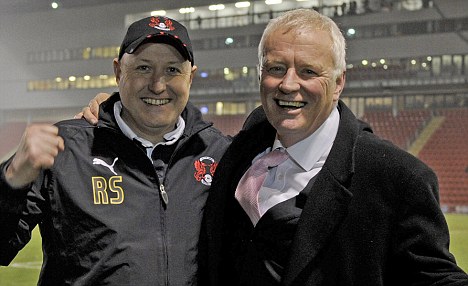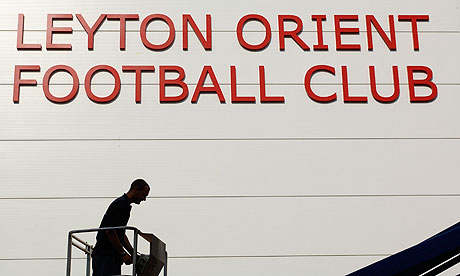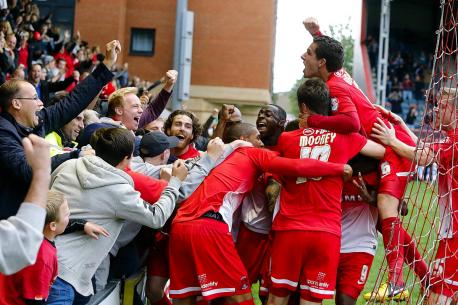
For almost all of my 41 years I have been a proud supporter of the second oldest football team in London – Leyton Orient. I say almost all, as I am ashamed to say that for a few years at school, I could not admit to my friends that I did not support one of the big ‘top flight’ clubs that they all seemed to.
Regular readers of my blog may wonder why I am writing a post about a football team that is largely unknown outside of Greater London (to the non-football fan), let alone to those not from these shores. I have always wanted to find a reason to write about my football club, and that time has come.
As the title suggests, this post is all about leadership. In order for an organisation to transform itself into one that is truly customer centric, it requires strong, committed, innovative, focussed and inspirational leadership. It is often difficult to find great examples to cite of leaders that fit this description. That is why I want to share with you the story of a little football club in the East End of London, and how leadership can truly transform the fortunes of an organisation.
Firstly, let me give you some context. Leyton Orient was formed in 1881. In the 133 years that the club has been in existence, it has not won anything of any significance. One solitary season in England’s top division and one FA Cup semi-final are the two ‘top’ highlights in an amazingly uninspiring existence.
Leyton Orient is not unique. The majority of football clubs in England and Wales have experienced little success. However, the definition of success to a Leyton Orient fan is not quite the same as an Arsenal or Manchester United follower. In my 41 years, I have seen Leyton Orient promoted twice. In 1989, I celebrated as we won the Division 4 play-off final at Brisbane Road – it was an experience I will never forget – to me it was like we had won the world cup. In 2006, on a sunny day in Oxford, I saw my lovely O’s automatically promoted for the first time in a generation – it took a while for me to get my voice back.
If you do not experience success very often, it feels remarkably special when you do. Most Orient fans see the avoidance of relegation each year as success. Reaching the magic 51 point mark is greeted with glee. This may sound like a ‘cup is half empty’ culture – you are probably right to think it – but that is just what we have got used to.
Throughout its existence, Leyton Orient has walked a tightrope of financial survival. The financial challenges experienced by football clubs are very well documented. Orient last faced challenges like that in 1995. Famously sold to Barry Hearn for £5, the much misunderstood sports promoter has spent the subsequent 19 years turning Orient into a sustainable business. Sustainable does not necessarily mean successful in the eyes of Leyton orient supporters. However, to business owners all over the world, sustaining a business through tough economic times is a huge success in its own right.

Barry Hearn’s ownership of Leyton Orient is the first example of leadership I wish to share with you. As a qualified accountant, Barry knows how to make and manage money. It is easy to throw stones at a charismatic man who has had a career in the media spotlight. Turning an unfashionable lower league football club into a strong, sustainable business is really not easy. Barry Hearn has never ‘thrown money’ at Orient – there will be fans who begrudge him that, but he has spent a lot of money ensuring that Orient do not go the way of many others – some of who have tasted big success, only to feel that crushing blow of a very quick demise.
Creating a sustainable football club may have turned Orient into a boring business – we last achieved promotion on 2006. Since then, we have not achieved promotion or relegation – we have not even reached the play offs. However, as the 2013/14 season draws to a close, Orient fans are more optimistic than they have been at any time in the last 133 years. The reason for that optimism is in the second example of leadership I wish to share.
The last time Barry Hearn sacked a manager was in 2010. With the club facing relegation back to League 2, Barry decided that he had to do something. Another trait of a good leader is loyalty – sacking a manager is something that Barry Hearn does not do lightly. Recruiting a new manager is also a very important task. In 2010, Barry Hearn recruited Russell Slade – and what a recruit he has turned out to be.
Russell Slade is a very nice man. Softly spoken and always smiling, he comes across more like a school teacher (his first profession) than a football manager. In his four years as manager of Orient, he has taken them to the 5th round of the FA cup and two 7th placed finishes in League 1. This may not sound like a lot to a Manchester City fan, but to a die-hard Orient supporter, these are heady days. During this time, Russell Slade has not spent a single penny on players. I repeat, in four years as manager of Leyton Orient, not a single fee has been paid for an incoming player.
On the 25th May 2014, Russell Slade will proudly walk his team out onto the hallowed turf of Wembley stadium – the full contingent of Goldings will be there to see the magic moment. Against all the odds, Russell Slade has guided his ‘free’ team to the brink of the Championship. With a financial budget smaller than anyone else in the league, Russell Slade has not been able to spend his way to Wembley. Russell Slade has achieved something that many leaders fail to do. He has generated success through his leadership. Through tenacity, patience, passion and commitment, he has spent four years injecting a new spirit into Leyton Orient. Russell Slade is a man who understands the importance of people, and his people understand the importance of his leadership.

In his four years as manager (he is now the fourth longest serving manager in English football), he has taken his time to build his team. Not every player that has joined the club has fitted in to his ethos – and I am sure he would be the first to say that. But as his team assemble at Wembley on Sunday, most of them have been together for at least two of Russell’s four years. Some of them have turned down ‘job offers’ elsewhere – even the lure of more money has not proven to be as attractive as being a part of Russell Slade’s revolution.
Like all great leaders, Russell has a philosophy that underpins his approach – this was recently reported in the London Evening Standard:
“The four greatest values my team have got are our work ethic, desire, character and, above all, togetherness,” he said. “Those values will be massively important if we are to get into the Championship and we have turned that into a plaque and put it in the tunnel. I put up loads of values on the wall and asked the players what they thought were the most important. The players wrote them down themselves and they were the four things that came out on top of everything. It was not our goalscoring, our defensive ability or anything like that. The players could put anything and they saw those four as the most important. Those are the things that define our team.”
Even if you are not a football fan, you would find it hard not to be impressed by this approach and attitude. As a Leyton Orient fan, it sends shivers down my spine. I have always believed that business can learn a lot from football – or any sport for that matter. But in recent years, as the fine line between business and football has disappeared, I have become less certain as to who can learn from who. As the multi millionaire football chairmen line up to dismiss their managers after a few bad results, it appears as though money is the only important thing. Leyton Orient is different – the whole attitude to football is different. Even if Barry Hearn’s motivation was money focussed in 1995, there is no doubting that his view has become different as well. Barry Hearn has become unusual as the owner of a football club as his love for the team is now greater than his desire to make money from it. You might not believe it, but I completely believe this to be true.
Business can learn a lot from Barry Hearn and Russell Slade. The most important thing is survival – above anything else. We all have a responsibility to ‘get the basics right’ to ensure that colleagues and customers (players/staff and fans) have a business (football club) to interact with. We need our leaders to understand the real value of people – to empower them to be part of the change, rather than have change done to them. Having the courage to allow a team to grow together will make it easier to keep that team together. If you can achieve that, your team will work hard (work ethic), whilst having the desire, character and togetherness to deliver success for themselves and their customers (fans).
I pray with all my heart that this team, and its loyal fans (customers) receive the reward they so richly deserve – it has been a long time coming. Even if we do not win on Sunday, what this organisation has achieved is remarkable, and they have the leadership to pick them up and start all over again with the same group next year. I love Leyton Orient, and I thank them for allowing us to keep dreaming.
Good luck on Sunday Barry, Russell and all the players and colleagues of Leyton Orient FC – I will be there cheering you on.
Up the O’s



